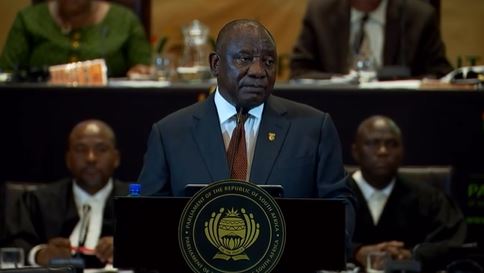President Cyril Ramaphosa announced that a National State of Disaster has been declared to deal with the electricity crisis. He was delivering his 7th State of the Nation Address on Thursday 9 February.
Ramaphosa spoke at length about the ”debilitating electricity shortage that has caused immense damage to our economy.”
We know that without a reliable supply of electricity, businesses cannot grow, assembly lines cannot run, crops cannot be irrigated and basic services are interrupted.
Load shedding means that households and supermarkets are unable to keep food fresh, water supply is often disrupted, traffic lights do not work, streets are not lit at night.
Without a reliable supply of electricity our efforts to grow an inclusive economy that creates jobs and reduces poverty will not succeed.
Ramaphosa says meaningful action will be taken to end load shedding as soon as possible.
The President also outlines the progress that has been made in implementing the Energy Action Plan that he announced in July last year.
But he added that in a time of crisis, a ”single point of command and a single line of march” is needed, which is where the National State of Disaster comes in.
Just as we address the cause of the crisis, we also need to address its impact.
The crisis has progressively evolved to affect every part of society.
We must act to lessen the impact of the crisis on farmers, on small businesses, on our water infrastructure and our transport network.
The National Disaster Management Centre has consequently classified the energy crisis and its impact as a disaster.
We are therefore declaring a national state of disaster to respond to the electricity crisis and its effects.
Here is what it means in practical terms:
- The state of disaster will enable government to provide practical measures to support businesses in the food production, storage and retail supply chain, including for the rollout of generators, solar panels and uninterrupted power supply.
- Where technically possible, it will enable government to exempt critical infrastructure such as hospitals and water treatment plants from load shedding.
- It will enable government to accelerate energy projects and limit regulatory requirements while maintaining rigorous environmental protections, procurement principles and technical standards.
- The Auditor-General will be brought in to ensure continuous monitoring of expenditure, in order to guard against any abuses of the funds needed to attend to this disaster.
Ramaphosa also announced he would appoint a Minister of Electricity in the Presidency to assume full responsibility for overseeing all aspects of the electricity crisis response, including the work of the National Energy Crisis Committee.
This new Minister will focus full-time and work with the Eskom board and management on ending load shedding and ensuring that the Energy Action Plan is implemented without delay.
Extraordinary circumstances call for extraordinary measures.
The energy crisis is an existential threat to our economy and social fabric must spare no effort, and we must allow no delay, in implementing these measures.
You can read the President’s full SONA 2023 speech HERE.
The state of disaster will enable us to provide practical measures that we need to take to support businesses in the food production, storage and retail supply chain, including for the rollout of generators, solar panels and uninterrupted power supply.https://t.co/VhX6ug891l
— Cyril Ramaphosa 🇿🇦 (@CyrilRamaphosa) February 9, 2023


